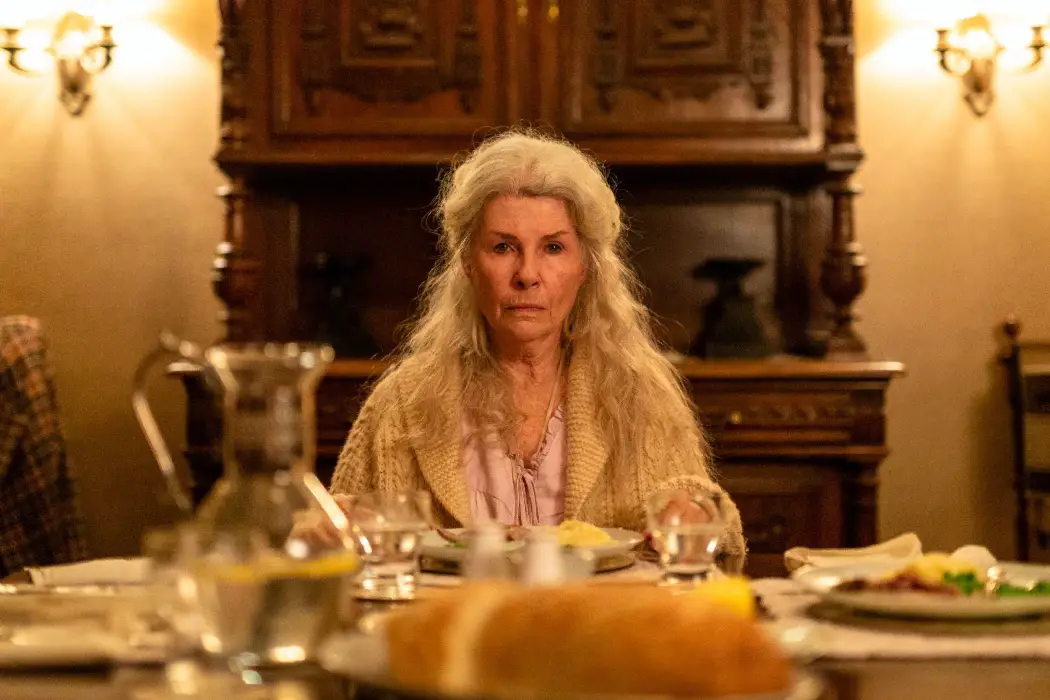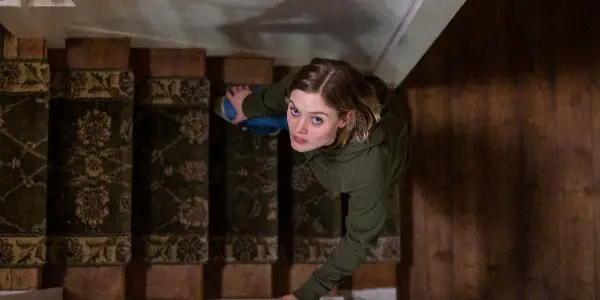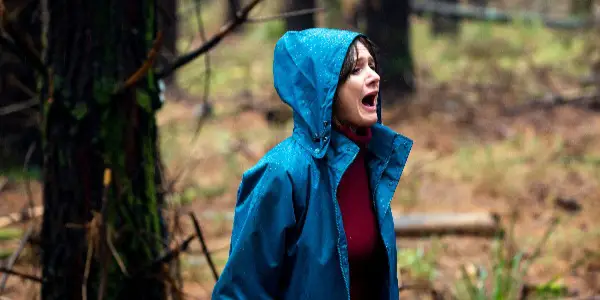“It Was Always Really Important That Philosophically, It Wasn’t This Inherently Evil Force.”Interview with Natalie Erika James, Director of RELIC

Alex is a 28 year-old West Australian who has a…
When we first encounter Edna, the elderly matriarch at the centre of Natalie Erika James’ Relic, she stands alone in her decaying Gothic den, cryptically gazing over her shoulder as the sinister shapes that lurk in the shadows gently envelope her cowering figure. It’s an introduction that could suitably slide right into another “Conjuring Universe” chronicle, but James’ feature debut takes the genre’s crooked tools of fortifying fear to bore into the essence of its trio of central characters, with a sharp focus on metaphorical dissections – rather than the literal.
Co-written by Christian White, James’ thematically-naked approach to the haunted house picture – which has seen a recent revival with the similarly stark chillers Hereditary, The Lodge and The Babadook – circles around three generations of women who are torn apart – and possibly reconciled – by ghosts, but the real horror that haunts the forlorn lineage is the terrifyingly real prospect of Alzheimer’s, a diagnosis first indicated when Kay (Emily Mortimer), receives a late-night call from a Melbourne police officer to let her know that her aging mother has gone missing.
Arriving at Edna’s abandoned abode with her own daughter Sam (Bella Heathcote), Kay’s fears are delicately realised when she sees the cluttered wooden homestead decorated by post-it notes, that slowly escalate from the fairly innocent “take your pills” to the alarmingly vague “get out”, a decree with noticeably worse hand-writing to match its unnerving quality – and it all goes downhill from there.
Ahead of the film’s Australian July 10th premiere on the streaming service Stan, I had the chance to talk to Natalie Erika James about her new film, the shorts that led her to Relic, her writing partnership with Christian White and what she learned on the set of Upgrade.
Alex Lines for Film Inquiry: To begin with, your VCA Graduation Short, Tritch, was what got the attention of the Carver Films Partners, (who produced Relic) and I believe at the time you initially pitched them a feature-length version of it, do you see any of its DNA in Relic?
Oh, good question. To go into that story, to be clear, when you finish film school, your third year is such a slog, you put so much pressure on yourself as a young filmmaker that when you finish the course, I would be so impressed if anyone had the energy to have a full-blown script feature script ready to go. When I had that meeting with Carver Films, because I had so much respect for them – they’d done Snowtown, which I loved – I really just made it up on the spot that I had something and so what I wrote in those two weeks was an outline – I mean, I shudder to think now what that looks like.
I can’t really say with any clarity, whether that is evident in Relic, I’m going to go with probably not, because I probably just threw it all together in an attempt to get them on board, but they very wisely passed on it. I think these things take time and you have to go make a whole bunch of mistakes before you can make something that connects with people in some way.

Speaking to that, I found a number of parallels and lateral echoes that Relic shares with Creswick and Drum Wave, do you feel that these are all of a piece with each other?
Yeah, definitely. Creswick is of a set with Relic because we made it very consciously as a proof of concept. We reverse-engineered it, I think a lot of people will make a short and then think, “Oh, this could be a feature”, but I co-wrote it with Christian White, and we already had the first draft of Relic down and we very consciously thought, “Let’s make a proof of concept to use as a calling card”, with a more succinct story, but still showcasing the same tone and setting. I would say that they fit together really nicely and there is a lot of Creswick in Relic as well, which was wonderful to drawback to.
All of these past films, including Relic, obviously stem from very personal places, so for you, how did you find the balance of negotiating the visual manifestations of these very real anxieties and fears whilst also having to deliver an accessible cinematic horror experience?
Yeah, I guess that is the struggle. I mean, as a filmmaker and a storyteller, you’re just drawn to stories or issues that are important to you, that’s where the personal element comes into it. I suppose in a way you have a degree of knowledge or authority about the subject if you’ve experienced it yourself and I think it’s important to touch on that through your storytelling to hopefully convey emotional truths. That’s why I personally choose to tell stories from a very personal place.
It’s a common thread in my work. I clearly have some fascination or some sort of masochistic tendency to just draw on my own fears and use them as vehicles to tell a story about the topic. In terms of the imagery, I think it’s a combination of things; It can be drawn from anything, from your dreams or nightmares that you’ve had yourself or even the things that used to scare you as a child can be a great inspiration as well.
In 2017 you took part in a director attachment on Leigh Whannell’s Upgrade – what were some of the major lessons you took from that experience and did you find it helpful when working on Relic?
To me, the director’s attachments are so useful and I really do think that the biggest kind of thing that comes out of them is just mentally preparing yourself for the task ahead. I wouldn’t point to any hard skills in terms of direction or craft necessarily, it’s more seeing how a director approaches problem-solving when shit hits the fan. I think that was the most useful lesson in terms of just seeing the different ways in which Leigh problem solved, I think that was really impressive.
Also just being able to be prepared for the pressures placed on a director. He also often bought the crew a food van every Friday, and whilst I didn’t necessarily take that on, that was an interesting kind of morale booster, which I thought was really sweet and admirable.
About the film’s script, can you talk about your creative partnership with Christian White, and what his work brought to this film in particular?
We work really closely together. It’s pretty loose, I would say we don’t have like a rigid structure to how we work, but we’re never in the room together when we write, we write separately, but then we come together to brainstorm to plot it out, to chat through the obstacles and come up with creative solutions. For example, whenever we’ve been working on a new script for a new film, one of us will take it for three weeks and then the other will have it for three weeks and then we slowly work our way down to every other day or we’ll split the film in half and I’ll do one half and he’ll do the other half in the swap.
It’s worked out really organically. He’s an incredible writer and he’s an author as well so I love to call him the proper writer, whereas I’m just masquerading as a writer, but I think our skills are really complimentary and he’s so much faster than me at writing as well, I tend to take my time. As you’d expect from a director, my approach is more visual I would say and he’s better at dialogue, structure, and the connective tissue. I think my focus is really the fanatic drive and some of the horrors set pieces, that kind of thing.
It’s a really happy marriage of sorts. Both of us are quite good at trusting each other and I feel like neither of us have too much ego, which is really important when you’re writing, because it’s not about whose winning or anything like that. It’s not a competition. It’s more like the best idea is used and that comes out of the back and forth that we have.

In regards to the film’s influences, I think on a surface level it may be easy for people to say recent titles like Hereditary or The Babadook, but tracking your history, I’d imagine directors like Masaki Kobayashi (Kwaidan), in terms of the horror being far more psychological, with fear coming from what you’re not seeing and the slowly building sense of doom; what would you say are some artistic influences that audiences may not pick up on from first glance?
I definitely think the callback to the Asian horror tradition is hard to ignore and I hope that comes through because I was a massive fan of that kind of cinema growing up in the late nineties, early noughties, classic Asian horror. My first big film director love was David Lynch, who always had this surreal uncanniness and there’s always a sinister tension underlying a lot of his work. I was also into Cronenberg growing up and I think my love for prosthetics is probably owed to him as well.
I’m a massive South Korean cinema fan, Park Chan-Wook is one of my favourite directors as is Bong Joon-Ho, like Mother is definitely a top 10 for me. There’s Ben Wheatley as well, he’s a great British director. I brought up Kill List a lot when I was pitching the film because you often have to justify the slow burn nature of it and Kill List is a great example of something that has this sinister tension throughout and then it just goes haywire at the end. Some other favourite directors include Peter Strickland, I really loved The Duke of Burgundy, the lushness of it. Yorgos Lanthimos, I mean, who doesn’t love him. I saw Dogtooth in 2009 at MIFF and it just blew me away.
I read an article by the director of The Grudge, who subsequently did the American remake too, and the one thing he majorly struggled with within the translation process is that the evil that slowly chases the characters is not angry, that its not about anger at all – was this thematic underpinning something quite important to you in the film’s construction?
Yeah, completely. I think that is one of the key things that often differentiates traditional Asian horror from more Western horror is that the menace or the ghost, or whatever it is, is often quite sympathetic. I think that is partially because a lot of the Japanese ghosts or South Korean ghosts are often wronged women, so there’s inherently this empathy that you have for them. It’s more about putting their anguish to rest. It was perfect for Relic because at no point did we want it to be a critique of people with Alzheimer’s or imply there was some evil lurking underneath.
The Alzheimer’s obviously makes her act out and become aggressive and violent and it’s scary to see that transformation, but in her final form, she really is someone we should be sympathetic to and you really get a sense of her fragility and vulnerability. It just mimics what happens in real life with people at the end of their lives – it was always really important that philosophically, it wasn’t this inherently evil force.
Film Inquiry thanks Natalie Erika James for taking the time to talk with us.
Relic will be released on the Australian streaming platform Stan and all major digital platforming services in the US on July 10th.
Watch Relic
Does content like this matter to you?
Become a Member and support film journalism. Unlock access to all of Film Inquiry`s great articles. Join a community of like-minded readers who are passionate about cinema - get access to our private members Network, give back to independent filmmakers, and more.













